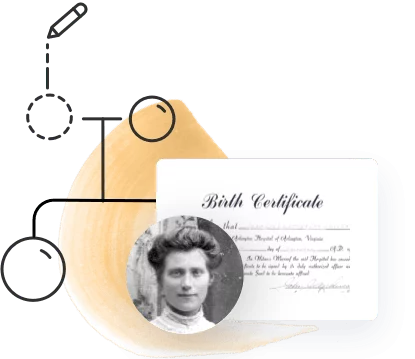
Whether you’ve never thought twice about it or it first sparked your interest in family history, your surname holds powerful clues about your ancestry — from where your family lived to the work they did and the cultures that shaped them.
Finding out where your surname comes from isn’t always simple. But with the right approach (and the right genealogy tools), it can lead you to exciting discoveries that can challenge your beliefs of who you are and where you come from.
In this article, we’ll be looking at surnames and the insights they offer into the lives of your ancestors. So, stick around as we uncover how to look into yours.
Start by breaking down the name itself
Some surnames are clearly occupational, with names like Smith, Baker, or Shepherd telling you right away what an ancestor likely did to earn a living. Others reflect a place (like Hill or Wood), a father’s name (Johnson, Robertson), or even a personality trait (Sharp, Strong, Wise).
If you’re not entirely sure what category your surname falls into, ask yourself:
- Does it sound like a job, a location, or a person’s name?
- Is it common in your country or region?
- Are there variations in spelling across generations?
Should you hit a stumbling block, try using the MyHeritage Last Name Directory that lets you find surname origins, meanings, and how the name has evolved.
Look at where the name appears
Sometimes the name alone doesn’t tell you much, but where it shows up can. That means you can try searching historical records to see:
- Which regions the surname is most common in
- How far back it appears in that area
- Whether clusters of the name appear in certain towns or occupations
For example, if the name “Ashworth” appears consistently in Lancashire records for 200 years, that’s probably your starting point, even if your family later moved to Canada or the U.S. Census records, immigration papers, and birth or marriage documents can all help place your surname in time and space.
Consider language shifts and spelling variations
Something else to think about is how language has evolved. Surnames change more than people expect, and they might shift in spelling, pronunciation, or even structure, especially when families move across borders or languages.
Names like “Schmidt” can become “Smith.” “MacDonald” might turn into “McDonnell” or “Donnell.” And handwritten records sometimes contain simple transcription errors that stick. As such, don’t assume every spelling variation is a different name.
If the rest of the details line up (dates, locations, family members), it’s probably the same surname evolving with the progression of time.
This is where MyHeritage’s Smart Matches™ and search filters come in handy. You can try alternate spellings or phonetic variations and track how the name appears in different decades or regions.
Pay attention to cultural context
Surnames reflect history. Some were created because of colonial systems, immigration requirements, or religious customs. Others were forced or assigned by governments or institutions in place of traditional naming systems.
For example:
- Jewish surnames were often assigned by tax authorities in the 18th and 19th centuries
- Indigenous names were sometimes replaced with English ones in school or census records
- Immigrants arriving at Ellis Island might have adopted simpler or more local-sounding names to blend in
Understanding this context matters, as it explains not just where a name came from, but why it changed or why it may not tell the full story. The knowledge you uncover helps you approach records with more clarity, curiosity, and care.
Talk to family… and then go further
Before diving deep into records, check with older relatives. They might remember stories, nicknames, or earlier spellings of your surname that don’t show up online. Oral history can be messy, but even small details can help you connect the dots.
Once you have a rough idea of where your surname might have come from, start working backwards. Look for consistent appearances of the name in records, note regional patterns, and see how it links to other families or occupations.
And if you’re completely stuck? Try a DNA test on MyHeritage. It won’t give you a direct meaning for your name, but it can connect you to relatives whose trees might hold the answer.
Begin exploring your surname history today with MyHeritage. Search historical records, order a DNA kit, or explore your family tree at MyHeritage.
Surnames offer a world of possibilities on MyHeritage
Finding the origin of your surname can be fun on its own, but it also opens the door to understanding where you came from. Whether your name points to a small village, a trade, or a family tradition, it’s a thread you can follow across time.
And like everything in genealogy, it starts with curiosity and a willingness to double-check what you think you know. With MyHeritage, you can explore surname history, migration patterns, and real records that bring those names to life. It’s about finding names, but also about discovering the story behind them.
FAQs about finding your surname origin
My surname shows up with 3 different meanings online. How do I know which one’s right?
You don’t, at least not immediately. Context matters more than the definition. If your family’s from Wales, that “Dutch” explanation probably isn’t the one you need to chase.
What if I can’t find my surname in records?
That’s more common than you’d think. Sometimes the spelling changed over time, or it’s been altered so much that the original version is buried. Try asking relatives if they remember a different version. Even a minor spelling variation can lead to valuable results.
I’ve got a hyphenated surname. Is that going to mess everything up?
Not really, but you’ll want to search each part on its own. Most hyphenated names are relatively modern, so older records may only show one half or drop the hyphen altogether.
Could my surname have been made up?
Absolutely. People invented names all the time, sometimes to fit in, sometimes to avoid trouble, and sometimes just because they wanted a clean slate. Doesn’t make it any less valid.
Can DNA results actually tell me where my surname comes from?
Not directly, no. But they can connect you to relatives who’ve already done some digging, and that can lead you to regional patterns, name clusters, or even historical migrations that help make sense of it.
What if my surname just means “son of John” or something basic like that? Is it even worth researching?
Sure. Even common names have roots. You might not get a mind-blowing story, but you could find out where your branch of the “Johnsons” settled or when they first appeared in records — and that’s still valuable.
Are surname meanings always literal?
Not always. Some sound like they should mean one thing, but were actually used symbolically, or just phonetically evolved from something else. A name that looks like a job title might’ve come from a place, or vice versa.




